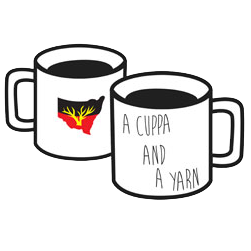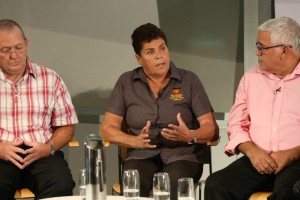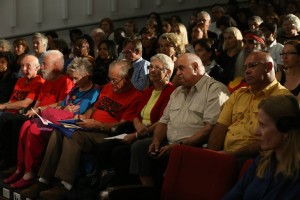31 March, 2015
The Freedom Ride 50th Anniversary celebrations culminated with a panel discussion at the University of Sydney on 20 March, titled “Controversial Conversations: Freedom not Frustration”.
Guest speakers included University of Sydney Deputy Vice-Chancellor Professor Shane Houston, Aboriginal and Torres Strait Islander Social Justice Commissioner Mick Gooda, Murdi Paaki Regional Assembly Chairperson Sam Jeffries, Wurli-Wurlinjang Aboriginal Health Service Director Dr Marion Scrymgour, National Congress of Australia’s First Peoples Co-Chair Kirstie Parker and NSWALC North West Councillor Anne Dennis.
Each of the panelists agree in the fight for Aboriginal Rights and things have improved for mob 50 years on. We’ve come a long way, but there’s still a long way to go. Kirstie Parker qualified this statement by saying she doesn’t take for granted the freedom that she now enjoys compared to her own mother, like the right to an education.
However she said it was a traumatic time last year when the Federal Government proposed changes to section 18C of the Racial Discrimination Act, which if passed would have made racism legal. Attorney-General George Brandis lobbied for the proposed changes under the guise of freedom of speech. Thankfully, the push was abandoned by the Government after public pressure.
Dr Scrymgour said Aboriginal Health remains appalling and the gap is far from closing, while Councillor Anne Dennis praised the NSW Aboriginal Land Rights Act 1983 but stressed there’s over 25,000 outstanding land claims that still need to be resolved.
Professor Houston questioned whether the Freedom Ride is a reenactment or revival. Also discussed was the Federal Government’s half a billion dollars in funding cuts under the Indigenous Advancement Strategy and Western Australia Premier Colin Barnett’s announcement to close 150 Aboriginal communities in Western Australia, a decision supported by Prime Minister Tony Abbott.
The PM recently attracted widespread criticism when he said the government can’t afford to fund the “lifestyle choices” of Aboriginal people. To many, it was an insult and attack on the world’s oldest-living culture and our connection to country.
This is why NSWALC supports WA mob in opposing the closure of their communities. Mr Gooda said he can’t find too many examples of where mob are failing- it’s usually from the “rescuers”, he said. Governments say you can’t throw money at the problem, yet they do. They also say a one-size approach doesn’t fit all yet they develop one-size-fits-all strategies. They also say that Aboriginal people need to take responsibility for our lives, but they do take that responsibility away. Keep an eye out for Controversial Conversations on NITV’s Current Affairs Awaken program during Reconciliation Week.



